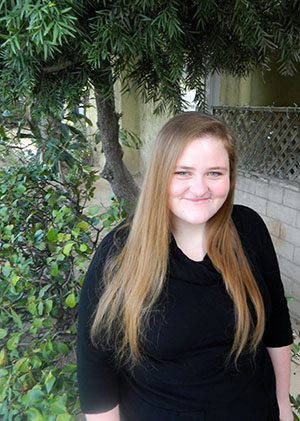Kelly Miller, 24, Psychology
Kelly Miller came to psychology through literature. She started out at Pomona College thinking she’d major in English because of how much she loves being able to venture into a character’s mind. Thanks to a registrar error, however, her first class as a freshman at Pomona was an advanced seminar in clinical psychology.
It was just her, the professor, and three seniors. “I was intimidated but I stuck with it. We read scholarly journal articles—a first for me—learned basic clinical listening skills, and practiced with each other. To my amazement, I managed to do well. I felt as though I’d been thrown into the deep end of psychology and had managed to swim. Of course, I had no idea how much deeper the water could get.”
After that class, Miller realized that her passion was less for literary criticism than for exploring what she calls “the internal worlds of others,” and that psychology provides a systematic way to do so.
(Photo: Kelly Miller)

Today, she’s getting her Ph.D. in clinical psychology at the University of Southern California, researching how people use relationships to regulate their emotions. The questions she’s trying to answer, she says, include, “What happens in the body when people experience stress and seek comfort from parents or significant others? Why does going to others for comfort seem to work for some people but not for others? And how do difficult childhood experiences set us up to get sick later in life?” She also studies the physiology of worry—by measuring electrical activity in the brains of anxious children—as well as how anxiety and aggression can be passed from generation to generation.
Jessica Borelli, a psychology professor at Pomona and Miller’s undergraduate research advisor, said of Miller: “She has a razor-sharp intellect, has already conducted independent research that has the potential to change things in the field of relationship research, and is an extreme go-getter. She is a standout graduate student at USC despite being the youngest in her class. The National Science Foundation Fellowship is basically the biggest honor a graduate student in the sciences can get, and she got one on her first try.”
Miller considers the NSF grant her biggest professional accomplishment yet. “I continue to be blown away that the federal government saw enough promise in the way I think and work to make that kind of investment in me,” she said. “I’m motivated to show that their faith was well-placed.”
Her NSF project involves bringing young adults into the lab with their romantic partners and measuring things like their heart rate, breathing, cortisol, and oxytocin while they talk to each other about things like loss and ways in which they want their relationships to change. The resulting data, ideally, will determine why feeling vulnerable affects different people differently, and how someone’s entrenched beliefs about relationships explain why some people are better at both giving and receiving comfort.
“I’m most interested in why relationships are emotionally regulating for some people but dysregulating for others,” Miller says. “I hope that by gaining an understanding of why close relationships are protective for some people, I can make strides toward teaching all people how to have these protective relationships.” (Appropriately, she says that she and her lab mates are “freakishly close.”)
Miller realizes that she’s lucky to have found her passion. “I get intellectual stimulation in just about every stage of a research study,” she says, especially “the heart-pounding moment between writing the statistical syntax for your analysis and seeing what results you’ve achieved. While there are of course tedious moments, a great deal really is inherently stimulating—so much so that my work almost feels selfish at times.”
Outside of her studies, Miller enjoys doing improv comedy, as well as “crafty art projects, dancing in the pit at ska concerts, and going to lecture series at the Griffith Observatory.” The Southern California native plans on retiring to Claremont, her old college town, since Pomona offers free undergraduate classes to senior citizens. “I love that I could revisit literature, or try astronomy, or learn introductory Arabic. I’d like to spend my golden years exploring entirely new intellectual terrain, much like others want to retire to travel the world.”
See our complete 2014 list of the 30 top thinkers under 30 here.




